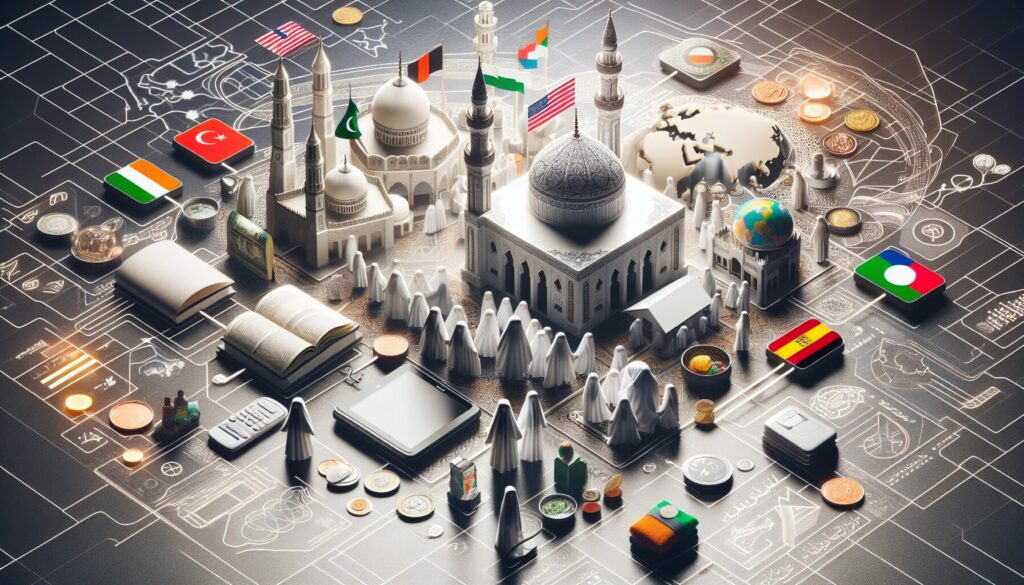On a recent trip to Australia, I was captivated by the vibrant cultural mix and traditions. A conversation over coffee with a new friend in Sydney about Islamic values opened my eyes to their relevance, even so far from their origins. These core beliefs—compassion, justice, charity, humility, and patience—resonate universally and play a crucial role in appreciating the diversity around us. Compassion aligns with the kindness Australians show mates, justice echoes the fairness ingrained in society, charity reflects the spirit of helping others, humility encourages modesty, and patience teaches perseverance. Understanding these values in Australia in 2025 is vital, as they transcend religious boundaries and embody universal ethics, fostering harmony in diverse communities. Embracing these shared principles builds bridges and creates an inclusive environment where everyone feels respected and valued.
The Role of Islamic Values in Australian Society

During my trip to Australia, I was struck by the vibrant mix of cultures. One day, while sipping on a flat white at a café in Sydney, I struck up a conversation with a fellow enthusiast. We dove into a discussion on how cultural values shape society, and it really highlighted the significant role that Islamic values play in this beautiful mosaic.
In contemporary Australia, Islamic values are woven into the fabric of everyday life, subtly influencing how communities interact and coexist. This is especially evident in cities like Melbourne and Sydney, where communities thrive on diversity and inclusivity. Australian society benefits from the promotion of these values in several key areas.
Community Building and Social Harmony
Islamic values foster a strong sense of community and belonging. In local neighborhoods, mosques and Islamic centers serve as hubs for social interaction and support. Events organized by groups like Islamic Council of Victoria bring people together, regardless of their faith, and promote understanding and mutual respect. These gatherings encourage dialogue and strengthen the social fabric of Australian communities.
Additionally, Islamic organizations often collaborate with other faith groups to address common societal issues. These partnerships enhance social harmony and demonstrate the power of collective action. For instance, initiatives by Australian National Imams Council have been pivotal in promoting interfaith dialogues, setting an example of unity in diversity.
Furthermore, Islamic values emphasize the importance of charity and helping those in need. This aligns with the Australian ethos of lending a hand to those doing it tough. Many Muslims actively contribute to charities and volunteer organizations, which has a positive impact on communities across the country.
In education, Islamic schools play a crucial role in shaping young minds. They instill values that encourage students to become compassionate and responsible citizens. These schools often participate in community service programs, further embedding the value of giving back into the lives of students.
Islamic values enrich the multicultural tapestry of Australia. Celebrations like Eid al-Fitr and Eid al-Adha are not only religious but also cultural events that invite everyone to join in the festivities. These celebrations offer an opportunity for Australians of all backgrounds to learn about and appreciate different cultures, fostering a sense of unity and shared identity.
Approaches to Fostering Open Dialogue
Fostering open dialogue about Islamic values in Australia requires a thoughtful approach that respects diversity while encouraging understanding. It’s essential to create spaces where people feel comfortable expressing their views and learning from others. Here are some practical methods to encourage such conversations.
Start with Active Listening
Active listening is key when discussing sensitive topics. It involves not just hearing words but truly understanding the message behind them. By actively listening, you show respect and empathy, which can help break down barriers and foster mutual respect. Encouraging this approach in community settings can lead to more productive and meaningful discussions.
For instance, when attending community events hosted by organizations like Islamic Council of Victoria or Australian National Imams Council, participants are often encouraged to listen actively. This not only enriches the dialogue but also builds trust among diverse community members.
- Practice Empathy: Try to see the world through the other person’s eyes.
- Ask open-ended questions to encourage deeper insights.
- Reflect back what you hear to ensure understanding.
Utilize Community Workshops
Community workshops are excellent platforms for open dialogue. They offer structured environments where individuals can share their perspectives and learn from one another. Workshops organized by local councils or community centers often invite speakers who are experts in discussing Islamic values within an Australian context.
These events can illuminate various aspects of Islamic culture, providing an opportunity to address misconceptions. Attending such workshops can be a great way to avoid some of the common mistakes people make when discussing Islamic values and to build a more inclusive community.
Leverage Online Platforms
In our digital age, online platforms have become crucial for dialogue. Social media and forums can be spaces where people from all walks of life engage in discussions about Islamic values. Facilitating respectful conversations online can help reach a broader audience and involve those who might not participate in face-to-face settings.
However, it’s important to moderate these discussions to ensure they remain respectful and constructive. Platforms like Islamic Council of Victoria often provide guidelines on how to conduct such discussions, ensuring a safe and welcoming environment for all.
By adopting these approaches, Australians can engage in meaningful conversations about Islamic values, fostering understanding and respect across different communities. Whether through active listening, community workshops, or online platforms, each method plays a vital role in bridging gaps and enhancing dialogue.
Overcoming Misconceptions and Stereotypes
Discussing Islamic Values in Australia can sometimes feel like walking through a maze of misconceptions and stereotypes. Fear not, my friend! We’re here to navigate this landscape together. One of the first steps in overcoming these misconceptions is to actively engage in conversations that are both open and respectful. Australia’s diverse tapestry of cultures and beliefs makes it a rich environment for such discussions.
Let’s dive into some practical approaches:
- Embrace Curiosity: When discussing Islamic values, approaching the topic with genuine curiosity can open a world of understanding. Instead of assuming, ask questions and listen to the experiences of Muslim Australians. This not only fosters a deeper connection but also humanizes the values being discussed.
- Challenge Stereotypes: It’s easy to fall into the trap of stereotypes, but questioning these preconceived notions is crucial. For instance, the portrayal of Muslims in media is often skewed. Engaging with authentic stories and experiences shared by Muslims in Australia can help dismantle these stereotypes.
- Engage with Community Leaders: Organizations like Islamic Council of Victoria and Australian National Imams Council play a pivotal role in promoting a better understanding of Islamic values. Connecting with these groups can offer insights and resources to help clarify misconceptions.
Understanding Through Shared Experiences
Australia’s multicultural scene is vibrant and full of opportunities for shared experiences. Participating in events such as Eid al-Fitr celebrations is a fantastic way to learn firsthand about Islamic values. These gatherings offer a chance to engage with the community, enjoy cultural food, and witness the beauty of compassion and justice in action.
Additionally, active listening is a powerful tool. By genuinely listening to others’ experiences and stories, we can bridge gaps in understanding. It’s not just about hearing words but about truly grasping the emotions and values behind them. This approach paves the way for more meaningful and informed discussions.
Education is a key ally in overcoming misconceptions. Encouraging schools and local communities to include comprehensive education on Islamic values can help future generations foster a more inclusive society. Resources from reputable organizations, such as Australian National Imams Council, can be instrumental in this educational journey.
By taking these steps, we can create a more inclusive and understanding Australia, where Islamic values are not only discussed but celebrated.
Promoting Inclusivity and Respect in Conversations

Promoting inclusivity and respect during discussions on Islamic values in Australia can sometimes feel like navigating uncharted waters. But fear not, my friend! With a little bit of compassion and active listening, we can foster conversations that are both respectful and enlightening. I remember a lovely encounter I had at a community event in Melbourne, where people from different backgrounds gathered to celebrate Eid al-Fitr. It was a beautiful blend of cultures, and the key to its success was the open, respectful dialogue that took place.
To truly promote inclusivity and respect, let’s dive into some practical steps:
- Understand Diverse Perspectives: Engage with a variety of viewpoints. This might mean attending events or joining discussions led by organizations like Islamic Council of Victoria or Australian National Imams Council. Such experiences broaden your understanding and demonstrate respect for diverse beliefs.
- Practice Active Listening: When someone shares their perspective, listen attentively. This means not just hearing their words but also understanding the emotions and values behind them. Showing genuine interest encourages open and honest conversations.
- Use Inclusive Language: Words carry power. Using inclusive language ensures that everyone feels respected and valued. Avoid stereotypes or assumptions, and instead, focus on language that reflects equality and mutual respect.
- Encourage Open Dialogue: Create spaces where individuals feel comfortable sharing their thoughts without fear of judgment or backlash. This might involve setting ground rules for discussions to ensure all voices are heard.
- Be Patient and Open-minded: Sometimes, discussions can get heated. It’s essential to remain patient and keep an open mind, even when disagreements arise. This attitude fosters a more productive and respectful exchange of ideas.
Additionally, it’s beneficial to engage with educational resources that explain Islamic values within the Australian context. Books, documentaries, and seminars can provide valuable insights. Consider resources recommended by Australian National Imams Council for credible and insightful information.
By following these practices, discussions on Islamic values in Australia can become more inclusive and respectful. It’s all about creating an environment where everyone feels valued and heard, paving the way for understanding and harmony.
Resources and Tools for Effective Communication
To better understand the vibrant mix of cultures in Australia, I did some research and connected with local communities. It was a rewarding experience, and I’ve gathered a few excellent resources and tools that can make discussing Islamic values not just easier, but also more meaningful for everyone involved.
Online Platforms and Tools
In our digital age, various online platforms offer a treasure trove of information and resources. Websites like Australian National Imams Council provide insightful articles and guidance on Islamic practices and values. They’re a fantastic starting point for anyone wanting to deepen their understanding.
Additionally, there are many forums and social media groups where people actively discuss these topics. Joining such communities can open up opportunities for respectful and enlightening conversations. Platforms like Islamic Council of Victoria offer community events and workshops, which are great for face-to-face discussions as well.
Books and Literature
Books are timeless resources. They allow for a deep dive into topics and can be revisited whenever needed. Look for books authored by respected scholars who have a knack for making complex ideas accessible. Libraries and bookstores in major Australian cities often have sections dedicated to Islamic literature. This makes it easier to find something that resonates with you.
Workshops and Community Events
Attending workshops and community events is a fabulous way to engage with others. These events often feature guest speakers who provide valuable insights and personal experiences. They also create a space for open dialogue, where active listening is key. In Australia, you’ll find that many community centers and mosques host these events regularly.
Educational Courses
For those wanting a more structured approach, enrolling in educational courses on Islamic studies can be immensely beneficial. Many universities and online platforms offer courses that cover a range of topics related to Islamic values. These courses provide a comprehensive understanding and also offer the chance to interact with knowledgeable instructors and fellow learners.
Utilizing these resources and tools not only aids in discussing Islamic values but also enriches one’s own understanding. The diversity of Australia makes it a fertile ground for such discussions, and these tools can certainly help bridge gaps and foster mutual respect and understanding.
Conclusion
Ultimately, understanding and embracing Islamic values within the Australian context fosters a more inclusive and harmonious society. By actively engaging in open dialogues, challenging stereotypes, and utilizing various resources, Australians can deepen their appreciation of the rich diversity that defines their nation. Here’s to building bridges and celebrating unity in diversity!
Continue Exploring
Unlock a world of meaningful family moments with our guide to engaging activities that celebrate and instill Islamic values. Dive into a treasure trove of fun and educational experiences that strengthen bonds and enrich your family’s spiritual journey.
Frequently Asked Questions
How do Islamic values contribute to community building in Australia?
Islamic values contribute significantly to community building in Australia by fostering a strong sense of community and belonging. Mosques and Islamic centers act as social hubs, promoting interaction and support among diverse groups. Events organized by groups such as the Islamic Council of Victoria help bring people together, promoting understanding and mutual respect, which strengthens the social fabric of Australian communities.
What are some effective approaches to discussing Islamic values in Australia?
Effective approaches to discussing Islamic values in Australia include practicing active listening, utilizing community workshops, and leveraging online platforms. Active listening involves truly understanding the message behind words, fostering mutual respect. Community workshops offer structured environments for sharing perspectives, and online platforms provide spaces for respectful discussions, reaching wider audiences.
How can misconceptions about Islamic values be addressed in Australia?
Misconceptions about Islamic values can be addressed by embracing curiosity, challenging stereotypes, and engaging with community leaders. Approaching the topic with genuine curiosity and asking questions helps foster deeper connections. Engaging with authentic stories shared by Muslims in Australia can dismantle stereotypes, while organizations like the Islamic Council of Victoria offer insights and resources to clarify misconceptions.
Fatima Ansari is an Islamic educator and writer with over a decade of experience teaching Quran and Islamic studies to children and families in Western Muslim communities. Growing up in North America, she saw firsthand the challenges Muslim families face in balancing faith with modern life, which inspired her to share practical guidance rooted in the Quran and Sunnah. Her mission with E-Quran Learning is to make Islamic education accessible, relatable, and inspiring for Muslim families across the United States, United Kingdom, Canada, Australia, and New Zealand.






